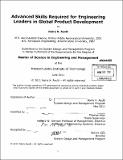| dc.contributor.advisor | Thomas Allen. | en_US |
| dc.contributor.author | Ayubi, Harry H | en_US |
| dc.contributor.other | System Design and Management Program. | en_US |
| dc.date.accessioned | 2012-05-15T21:13:05Z | |
| dc.date.available | 2012-05-15T21:13:05Z | |
| dc.date.copyright | 2011 | en_US |
| dc.date.issued | 2011 | en_US |
| dc.identifier.uri | http://hdl.handle.net/1721.1/70795 | |
| dc.description | Thesis (S.M. in Engineering and Management)--Massachusetts Institute of Technology, Engineering Systems Division, System Design and Management Program, 2011. | en_US |
| dc.description | Cataloged from PDF version of thesis. | en_US |
| dc.description | Includes bibliographical references (p. 85-88). | en_US |
| dc.description.abstract | Observations from first hand experience on the Boeing 787 Program during development of perhaps the most important and exciting new commercial airplane in recent history has identified opportunities to enhance the global product development skills of key engineering leaders. Extreme challenges related to typical factors (e.g., cost, schedule, quality) are coupled with a radically different business model - one shaped by a product development strategy that relies heavily on globally dispersed risk-sharing partners. In addition, the 787 would use dramatically new carbon composite materials and manufacturing methods for the airplane structure, as well as advanced technologies for the airplane systems and propulsion. This was further complicated by the parallel development of new design software intended for use in creating, sharing, and managing all 787 product definition data. The lead design engineer - among the most critical resource on the product development team - must engage on all fronts. Given the complexities of this endeavor, advanced skills are necessary for engineering leaders to succeed, and Boeing must ensure they have these skills. This research was intended to specify some of these advanced skills, identify deficiencies in the current workforce, and suggest ways in which industry and academia might team together to address such deficiencies. | en_US |
| dc.description.statementofresponsibility | by Harry H. Ayubi. | en_US |
| dc.format.extent | 89 p. | en_US |
| dc.language.iso | eng | en_US |
| dc.publisher | Massachusetts Institute of Technology | en_US |
| dc.rights | M.I.T. theses are protected by
copyright. They may be viewed from this source for any purpose, but
reproduction or distribution in any format is prohibited without written
permission. See provided URL for inquiries about permission. | en_US |
| dc.rights.uri | http://dspace.mit.edu/handle/1721.1/7582 | en_US |
| dc.subject | Engineering Systems Division. | en_US |
| dc.subject | System Design and Management Program. | en_US |
| dc.title | Advanced skills required for engineering leaders in global product development | en_US |
| dc.type | Thesis | en_US |
| dc.description.degree | S.M.in Engineering and Management | en_US |
| dc.contributor.department | System Design and Management Program. | en_US |
| dc.contributor.department | Massachusetts Institute of Technology. Engineering Systems Division | |
| dc.identifier.oclc | 792861154 | en_US |
